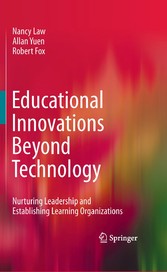Search and Find
Service
More of the content

Educational Innovations Beyond Technology - Nurturing Leadership and Establishing Learning Organizations
Foreword
6
Acknowledgement
8
Contents
10
List of Figures
16
List of Tables
18
Chapter 1: An Ecological Metaphor for Researching Technology Use and Pedagogical Innovations
20
ICTs in Learning and Teaching: Are They Sustaining or Transforming Technologies?
23
Pedagogical Practices as Competing “Species” in the Ecology of School Education
26
Outline of This Book
30
Chapter 2: Research Design and Methods
33
Case Study Design in SITES-M2
34
Case “Boundaries” in SITES-M2
35
Case Selection
35
Data Collection
36
Case Report Format
37
Selection of Cases for the Ecological Study
37
Chapter 3: Examining Innovativeness at the Classroom Level
46
Dimensions of Pedagogical Innovation
48
Developing a Scale of Innovativeness
49
Case Study Comparisons of Innovativeness “Profiles”
62
Variations Across and Correlations Between Different Innovation Dimensions
72
Regional Comparisons of Innovation Profiles
74
Discussion
75
Chapter 4: Student and Teacher Roles in ICT-Supported Innovations
78
Student Learning Activities and Roles
79
Student Roles and Extent of Pedagogical Innovation
89
Teacher Pedagogical Activities and Roles
90
Teacher-Role Clusters
92
Teacher Roles and Extent of Pedagogical Innovation
100
Teacher and Student Roles: How Related Are They?
103
Chapter 5: Pedagogical Practices, Technology Use, and Teacher Competence
105
Characterizing Pedagogical Practice
107
Pedagogical Practice Type and ICT Use
115
Innovativeness of Different Pedagogical Practices
117
Teachers’ Roles, Students’ Roles and Pedagogical Practice Types: Consistency and Anomalies
119
Teacher Competence and Pedagogical Innovation
120
Discussion: Teacher Professional Development and Policy Implications
126
Chapter 6: The Nature of Innovation Schools
128
Innovation Implementation and Educational Change
128
School Contextual Factors: Understanding the Nature of Innovative Schools
131
School Background
132
Schools’ Implementation Strategies
134
Principal Leadership
136
ICT Infrastructure
138
Government and Community Support
139
Summary
142
Chapter 7: Organizational Learning in Innovation Schools
145
Schools as Learning Organizations
146
Analysis of Four Innovation Schools
149
Summary and Discussion
164
Chapter 8: Pedagogical Innovations as Systemic Change: The Challenge of Sustainability and Scalability1
168
The Need for Systemic Change in Education
169
Exploring Systemicity and Change Through Exemplars of ICT-Supported Emergent Pedagogical Practices
171
Scalability and Pedagogical Innovation
172
Transferability of Innovations
175
Scalability and Leadership
178
Scalability and Government Support
181
Summary and Conclusions: The Need for Re-culturing
183
Chapter 9: Research into Practice: Using Case Studies in Professional Development
187
Case Studies: Different Types and How They Are Used
188
Case Study Examples in ICT Leadership and Professional Development
190
Comparison of the Content of The Two Databases
192
A Closer Look at The Utility of The Hong Kong Database
194
Using The Web-Based Case Studies in Professional Development
196
Usefulness of The Case Studies with Respect to Professional Development
204
Summary and Conclusions
205
Chapter 10: Changing Leadership Roles in Changing Times
206
Networks as Architecture for Learning and Educational Transformation
206
Leaders and the Changing Concept of Leadership
208
Using SITES-M2 Case Studies to Support MultilevelLeadership Development
211
Summary and Conclusion
224
Chapter 11: Education Innovations Beyond Technology
227
Ecological Niches and Context Dependence of the Innovations
229
The Crop and Keystone Species: Students’ Rolesand Teachers’ Roles
230
Types of Innovative Pedagogical Practices as a Species in the Classroom Ecology and Relative to Teacher Competence
232
Characteristics of Innovation Schools and Level of Innovativeness at the Classroom Level
233
Organizational Learning and Pedagogical Innovations
234
Sustaining and Scaling Pedagogical Innovations
235
Research into Practice: Ecologically Inspired Case-Study-Based Professional Development for Innovation
237
Using the SITES-M2 Case Studies to Build Professional Development Networks for Innovation and E-Leadership
238
Summary and Reflections
241
References
243
Index
251
All prices incl. VAT












